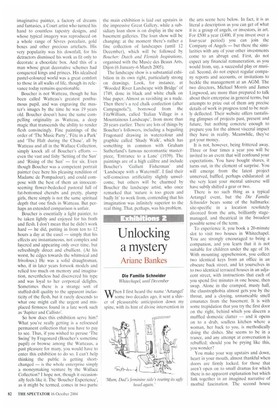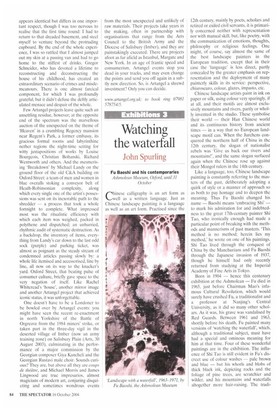Unlocking a mystery
Ariane Bankes
Die Familie Schneider Whitechapel, until December
When I first heard the name `Artanger some two decades ago, it sent a shiver of pleasurable anticipation down my spine, with its hint of divine intervention in the arts scene here below. In fact, it is as literal a description as you can get of what it is: a group of angels, or investors, in art. For £500 a year (£400, if you invest over a four-year period) you can join the Company of Angels — but there the similarities with any of your other investments come to an abrupt end. First, do not expect any financial remuneration, as you would from, say, a successful play or musical. Second, do not expect regular company reports and accounts, or invitations to heckle the management at an AGM. The two directors, Michael Morris and James Lingwood, are more than prepared to talk about their enterprise in general terms, but attempts to prize out of them any precise details of work in progress tend to be neatly deflected. Their website offers tantalising glimpses of projects past, present and future, but nothing concrete enough to prepare you for the almost visceral impact they have in reality. Meanwhile, they've got your money.
It is not, however, being frittered away. Three or four times a year you will be invited to an event that will confound your expectations. You have bought shares, it turns out, in the element of surprise. You will emerge from the latest project unnerved, baffled, perhaps exhilarated: at the very least your mental universe will have subtly shifted a gear or two.
There is no such thing as a typical Artangel event, but the Die Familie Schneider bears some of the hallmarks: site-specific in a location resolutely divorced from the arts, brilliantly stagemanaged, and theatrical in the broadest possible sense of the term.
To experience it, you book a 20-minute slot to visit two houses in Whitechapel. You are strongly encouraged to bring a companion, and you learn that it is not suitable for children under the age of 16. With mounting apprehension, you collect two identical keys from an office in an obscure back street, and let yourselves in to two identical terraced houses in an adjacent street, with instructions that each of you spend five minutes in one house, then swap. Alone in the cramped, musty hall, the claustrophobia almost gets you by the throat, and a cloying, unnameable smell emanates from the basement. It is with some trepidation that you try the first door on the right, behind which you discern a muffled domestic clatter — and it opens on to a drab, soulless kitchen where a woman, her back to you, is methodically doing the dishes. She seems to be in a trance, and any attempt at conversation is rebuffed; should you be prying like this, you wonder?
You make your way upstairs and down, heart in your mouth, almost thankful when doors are firmly locked, for those that aren't open on to small dramas for which there is no apparent explanation but which link together in an imagined narrative of morbid fascination. The second house appears identical but differs in one important respect, though I was too nervous to realise that the first time round: I had to return to that dreaded basement, and steel myself to venture beyond the protruding cupboard. By the end of the whole experience, I was so rattled that I almost jumped out my skin at a passing van and had to go home to the stiffest of drinks. Gregor Schneider, who has devoted a lifetime to reconstructing and deconstructing the house of his childhood, has created an extraordinary scenario of crimes and misdemeanours. There is one almost farcical component, for which I was profoundly grateful, but it didn't defuse the deftly articulated menace and despair of the whole.
Few Artangel projects leave quite such an unsettling residue, however; at the opposite end of the spectrum was the marvellous auction of the unexpected on the theme of 'Heaven' in a crumbling Regency mansion near Regent's Park, a former embassy, its gracious formal rooms and labyrinthine nether regions the night-time setting for witty juxtapositions of works by Louise Bourgeois, Christian Boltanski, Richard Wentworth and others. And the mesmerising 'Breakdown' by Michael Landy on the ground floor of the old C&A building on Oxford Street: a team of men and women in blue overalls stoking a conveyor belt of Heath-Robinsonian complexity, along which every single one of the artist's possessions was sent on its inexorable path to the shredder — a process that took a whole fortnight to complete. What impressed most was the ritualistic efficiency with which each item was weighed, packed in polythene and dispatched; an unhurried, rhythmic audit of systematic destruction. As a backdrop, the inventory of items, everything from Landy's car down to the last odd sock (purple) and parking ticket, was almost as poignant as the steady stream of condemned articles passing slowly by: a whole life itemised and accessorised, line by line, all now on its way to the knacker's yard. Oxford Street, that beating pulse of consumer culture, briefly gave space to the very negation of itself. Like Rachel Whiteread's 'house', another mirror image and another Artangel project that achieved iconic status, it was unforgettable.
One doesn't have to be a Londoner to be bowled over by Artangel events: you might have seen the recent re-enactment in north Yorkshire of the Battle of Orgreave from the 1984 miners' strike, or taken part in the three-day vigil in the deserted village of Imber (now an army training zone) on Salisbury Plain (Arts, 30 August 2003), culminating in the performance of a major commission by the Georgian composer Giya Kancheli and the Georgian Rustavi male choir. Sounds curious? They are, but above all they are coups de theatre, and Michael Morris and James Lingwood arc true impresarios, almost magicians of modern art, conjuring disquieting and sometimes wondrous events from the most unexpected and unlikely of raw materials. Their projects take years in the making, often in partnership with organisations that range from the Arts Council to the British Army and the Diocese of Salisbury (briber), and they are painstakingly executed. There are projects afoot as far afield as Istanbul, Margate and New York. In an age of frantic speed and consumerism, Artangel events stop you dead in your tracks, and may even change the points and send you off again in a subtly new direction. So, is Artangel a shrewd investment? Only you can decide.
www.artangetorg.uk.to book ring 07981 57875415.











































































































 Previous page
Previous page